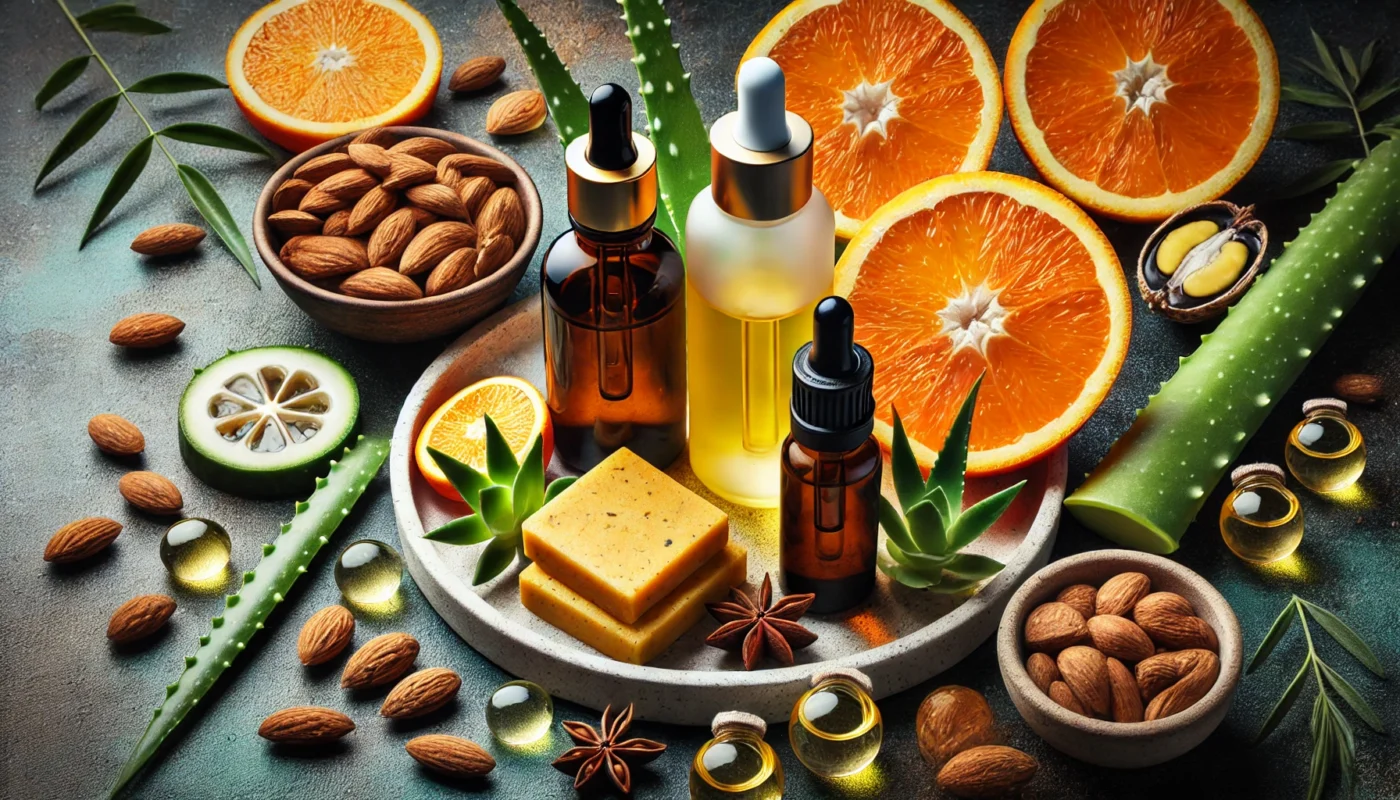The quest for radiant skin and luscious hair is universal. Yet, the secret to achieving this often lies within, in the form of essential vitamins.
Understanding the role of vitamins in skin and hair health can be a game-changer. It can help you make informed choices about your diet and lifestyle.
This article aims to shed light on the best vitamins for skin and hair. We delve into the science behind these vitamins and their benefits.
We’ll explore vitamins A, C, E, and D, along with essential B-vitamins. We’ll also discuss the importance of Omega-3 fatty acids and key minerals like zinc, iron, and selenium.
But it’s not just about knowing which vitamins to take. It’s also about understanding how to incorporate them into your routine effectively.
We’ll provide practical tips on dietary sources, supplements, and topical applications. We’ll also discuss common pitfalls to avoid, such as over-supplementation and potential interactions.
Finally, we’ll touch upon holistic and alternative approaches to skin and hair health. This comprehensive guide aims to empower you with knowledge, helping you make the best choices for your skin and hair health.
You may also like: Top Supplements to Speed Up Injury Recovery
Understanding the Role of Vitamins in Skin and Hair Health
Vitamins are crucial for maintaining vibrant skin and healthy hair. They act as building blocks, fueling numerous biological processes essential for beauty and health.
Each vitamin contributes uniquely to skin and hair maintenance. Some encourage cell turnover and collagen production, while others protect against environmental damage.
For those striving for healthy skin and hair, understanding how vitamins function can be empowering. Knowing their roles helps select foods and supplements that suit individual needs.
Many of these vitamins also function as antioxidants. This means they fight off free radicals, which are unstable molecules that can lead to oxidative stress and damage.
Moreover, vitamins support various other processes. They help with hydration, maintain skin elasticity, and even protect against UV exposure. These small compounds can influence skin tone, texture, and hair strength.
Key vitamins for skin and hair health include:
- Vitamin A: Promotes cell turnover.
- Vitamin C: Critical for collagen synthesis.
- Vitamin E: Protects against oxidative stress.
- B-Vitamins: Support hair growth and skin health.
- Vitamin D: Aids in skin repair and health.
Proper vitamin intake doesn’t just improve appearance. It also reflects on your overall health and wellbeing.
The Science Behind Vitamins and Your Body
Vitamins are organic compounds necessary in small quantities for various physiological processes. The body doesn’t always produce these compounds naturally.
The impact of vitamins on skin and hair begins at the cellular level. For instance, vitamins act as co-factors in reactions that produce collagen and keratin, essential proteins for skin and hair.
Vitamin deficiencies can lead to noticeable changes. Dull skin and brittle hair often signal nutrient shortages. This connection underscores the importance of maintaining balanced vitamin levels for aesthetic and health reasons.
Key Vitamins for Skin and Hair: What the Research Says
Scientific research continuously highlights the importance of certain vitamins for skin and hair health. Studies show that adequate vitamin intake can improve skin texture and stimulate hair growth.
For example, Vitamin A is crucial for epithelial tissue, affecting both skin and scalp health. Research has shown it can reduce acne and improve skin texture.
Vitamin C, a potent antioxidant, assists in collagen production. Studies indicate its role in minimizing fine lines and enhancing skin vitality. Its antioxidant properties also protect against damage from UV exposure.
Biotin, a member of the B-vitamins, has been extensively studied for hair health. Research demonstrates that it contributes to stronger, thicker hair by improving keratin’s infrastructure.
Here’s a quick overview of research-backed vitamin benefits:
- Vitamin A: Boosts cell turnover, combating acne.
- Vitamin C: Essential for collagen, supports elasticity.
- Biotin: Enhances keratin infrastructure in hair.
- Niacin (B3): Improves hydration and reduces redness.
Evidence suggests incorporating these vitamins through diet can offer substantial skin and hair benefits. While supplements are available, whole foods provide additional nutrients that enhance absorption and effectiveness.

The Best Vitamins for Skin and Hair
Identifying the best vitamins for skin and hair involves understanding which nutrients contribute most significantly to health and appearance. Vitamin A, C, E, B-complex, and D are among the top contenders, each offering distinct benefits. These vitamins address issues like dryness, thinning hair, and loss of elasticity.
Together, these vitamins form a powerful regimen for revitalizing your skin and strengthening your hair. Ensuring adequate intake through diet and supplementation can lead to visible improvements. Integrating these key nutrients into daily routines supports not only beauty but also overall health.
Vitamin A: The Skin Renewer
Vitamin A plays a pivotal role in promoting healthy skin cell turnover. This process is essential for maintaining fresh, radiant skin. It helps reduce wrinkles and fine lines, making it a popular ingredient in anti-aging products.
Moreover, Vitamin A is beneficial for those struggling with acne. It encourages the shedding of skin cells, preventing pores from clogging. This action reduces the formation of acne.
You can find Vitamin A in foods like sweet potatoes, carrots, and leafy greens. By incorporating these into your diet, you can naturally boost your skin’s renewal process. Consistent intake can lead to softer, clearer, and more youthful-looking skin.
Vitamin C: The Collagen Booster
Vitamin C is a powerhouse antioxidant that supports collagen production. Collagen is crucial for skin firmness and elasticity. By enhancing collagen synthesis, Vitamin C helps maintain supple, wrinkle-free skin.
This nutrient also protects the skin from environmental damage. Its antioxidant properties neutralize free radicals, shielding the skin from oxidative stress. This action can slow aging signs and promote even skin tone.
Citrus fruits, strawberries, and bell peppers are excellent Vitamin C sources. Including these in your diet can fortify your skin’s natural defenses and support its structural integrity. With regular consumption, your skin can look brighter and more resilient.
Vitamin E: The Protector
Vitamin E is celebrated for its protective antioxidant properties. It helps defend skin against UV damage and free radicals, reducing the risks of premature aging. This vitamin strengthens skin barrier function, crucial for retaining moisture and ensuring hydration.
Incorporating Vitamin E can soothe irritated skin. It is often recommended for those with sensitivities, as it calms inflammation and enhances healing. Many skincare products use Vitamin E for its soothing effects.
You can obtain Vitamin E from foods like almonds, sunflower seeds, and spinach. Enhancing your diet with these foods can boost your skin’s defense mechanism. Consistent Vitamin E intake ensures skin remains soft, supple, and well-protected.
B-Vitamins: The Growth Promoters
B-Vitamins, particularly B7 (Biotin) and B3 (Niacin), are key for hair growth and skin health. Biotin is well-known for strengthening hair, reducing breakage, and enhancing growth. It helps produce keratin, the primary protein in hair.
Niacin, on the other hand, improves skin texture by enhancing hydration. It assists in reducing redness and inflammation, making it beneficial for various skin conditions like acne and rosacea.
Beyond Biotin and Niacin, other B-Vitamins like B5 (Pantothenic Acid) support wound healing and skin barrier health. This comprehensive impact on both hair and skin makes B-Vitamins indispensable.
Rich sources of B-Vitamins include whole grains, eggs, and legumes. Including these in your diet can promote healthier hair and smoother skin. The synergy of B-Vitamins contributes to overall vitality and beauty.
Vitamin D: The Repairer
Vitamin D stands out for its ability to assist in skin repair and rejuvenation. This nutrient boosts skin cell growth and repair, vital for maintaining skin integrity. It is also involved in the skin’s immune response, helping combat inflammation and infections.
Research suggests a link between Vitamin D and hair follicle cycling. Adequate levels of Vitamin D can support hair health and prevent shedding.
Sun exposure helps the body naturally produce Vitamin D. However, balancing sun exposure with the risk of skin damage is vital. Foods like fatty fish and fortified dairy products can also provide Vitamin D, supporting skin and hair repair.
Essential Fatty Acids: Omega-3 and Omega-6
Omega-3 and Omega-6 are crucial for maintaining skin hydration and elasticity. These essential fatty acids support the skin’s barrier function, reducing water loss and preventing dryness. They also have anti-inflammatory properties, beneficial for conditions like eczema.
For hair, Omega-3 and Omega-6 nourish hair follicles, promoting stronger, shinier hair. They prevent hair loss and encourage healthy growth by maintaining the lipid content in the scalp.
Rich in Omega-3 are fish like salmon and mackerel, while Omega-6 is abundant in seeds and nuts. Including these in your diet can enhance skin radiance and hair health. Balancing these essential fatty acids is key to maintaining both skin and hair vitality.
Minerals for Skin and Hair: Zinc, Iron, and Selenium
Minerals like Zinc, Iron, and Selenium play critical roles in skin and hair health. Zinc supports skin healing and can mitigate issues like acne. It also strengthens hair follicles, reducing hair loss.
Iron is essential for delivering oxygen to hair follicles. A deficiency can lead to hair thinning and loss. Ensuring sufficient iron levels is crucial for maintaining full, healthy hair.
Selenium acts as an antioxidant, protecting cells from damage. It is also involved in hair follicle function. The presence of Selenium in your diet can safeguard both skin and hair against oxidative stress.
Integrating mineral-rich foods such as meat, legumes, and nuts into your diet can significantly enhance skin clarity and hair strength. These minerals are not just supportive but foundational for overall wellness.

How to Incorporate These Vitamins into Your Routine
Incorporating essential vitamins into your routine can be both straightforward and rewarding. Start by evaluating your current dietary habits and identifying any gaps. Aim to include a variety of vitamin-rich foods in your meals to naturally supply your body with these crucial nutrients.
If dietary adjustments alone aren’t enough, consider high-quality supplements as a complementary option. Combining dietary sources with supplements can ensure your body meets its nutritional needs. This balanced approach can enhance skin vitality and hair strength effectively.
Dietary Sources vs. Supplements: Finding the Balance
Determining the right balance between dietary sources and supplements is crucial for optimal skin and hair health. Whole foods provide a complex array of nutrients, including vitamins, minerals, and antioxidants. Consuming a varied diet rich in fruits, vegetables, lean proteins, and healthy fats is an excellent foundation.
Each food source offers unique benefits that supplements might lack. For instance, citrus fruits provide vitamin C alongside fiber, while nuts offer both vitamin E and healthy fats. This combination supports better absorption and overall health.
However, supplements can be beneficial when dietary intake falls short. Vitamin D, commonly lacking due to limited sun exposure, often requires supplementation. Biotin supplements might also be advantageous for those seeking enhanced hair growth.
- Aim for a colorful diet full of fresh produce.
- Consider supplements for vitamins like D and B12 if needed.
- Choose supplements verified by credible sources for quality assurance.
A strategic blend of both can fulfill nutritional needs while supporting glowing skin and vibrant hair. Balance is key to harnessing the full benefits of these nutrients.
Practical Tips for Supplementing Your Diet
When adding supplements to your diet, choosing quality products and integrating them effectively is crucial. Begin by researching reputable brands known for rigorous testing and ingredient transparency. This ensures you receive a product that delivers the desired benefits.
Consider discussing your choices with a healthcare provider. They can provide personalized recommendations based on your health needs. Supplements should complement, not replace, nutrient-rich foods.
- Prioritize brands with third-party testing.
- Follow dosage instructions carefully.
- Monitor your body’s response and adjust as needed.
Incorporating supplements should be a gradual process. This approach ensures you find what works best for your body. Remember, supplements are most effective when combined with a balanced diet and healthy lifestyle choices.
Topical Applications: Enhancing Skin and Hair Topically
Topical applications of vitamins offer a direct approach to nurturing skin and hair. Many skincare and haircare products are enriched with vitamins like A, C, and E. These ingredients help to target specific concerns like dryness, wrinkles, and dandruff.
Using topical vitamin-infused products can boost efficacy when applied regularly. For instance, serums and creams with vitamin C can brighten skin and fade spots. Hair masks containing biotin or vitamin E can improve shine and manageability.
It’s important to patch-test new products to ensure compatibility with your skin or hair type. Consider layering topical treatments for enhanced benefits. For example, vitamin C serum followed by a moisturizer rich in vitamin E can provide comprehensive care.
Topical vitamins, when used consistently, can complement dietary intake and supplementation efforts. Together, they create a robust regimen that supports overall skin and hair health.

Avoiding Common Pitfalls
As you seek to enhance your skin and hair health with vitamins, it’s crucial to avoid common mistakes. Missteps can include over-supplementation, ignoring potential interactions, and choosing low-quality products.
Taking too many supplements or using them incorrectly can lead to adverse effects rather than benefits. Always aim for a well-rounded approach. Consider both your dietary sources and any additional supplementation carefully to maintain a healthy balance.
Over-Supplementation and Toxicity Risks
Over-supplementation poses significant health risks, particularly with fat-soluble vitamins like A, D, E, and K. These vitamins accumulate in the body, potentially leading to toxicity. Symptoms can include nausea, headaches, and fatigue, which can escalate if unaddressed.
Maintaining the right dosage is crucial to avoid these issues. Always adhere to recommended daily allowances unless instructed otherwise by a healthcare provider. This is especially important with potent supplements that deliver more than 100% of daily values.
Regular blood tests can help monitor your vitamin levels. This approach helps prevent toxicity and ensures your supplementation is effective yet safe. Awareness and moderation are key to optimizing your health regimen without adverse effects.
Interactions and Contraindications
Vitamins can interact with medications or other supplements, sometimes reducing efficacy or causing harmful side effects. For instance, high doses of vitamin E can interfere with blood thinners, increasing bleeding risks.
Understanding these interactions is essential for safe supplementation. Always inform your healthcare provider about all supplements and medications you’re using. They can provide advice tailored to your individual needs and help you avoid harmful combinations.
In addition, some medical conditions might contraindicate certain vitamins. If you have kidney issues, for example, excessive vitamin D can exacerbate complications. Consulting with professionals ensures you make informed choices that support, rather than compromise, your health.
Holistic and Alternative Approaches
Holistic methods offer a comprehensive view of skin and hair health. They focus on balance and the body’s intrinsic healing capabilities. These methods often incorporate lifestyle changes and natural remedies.
Alternative approaches, such as acupuncture and yoga, can support vitamin absorption and overall health. These practices aim to enhance wellness from the inside out, facilitating better skin and hair outcomes.
The Role of Lifestyle in Vitamin Absorption
Lifestyle choices significantly impact how the body absorbs and utilizes vitamins. Regular exercise can improve circulation, enhancing nutrient delivery to skin and hair follicles. Staying active ensures vitamins are effectively distributed and utilized in the body.
Sleep is equally vital for absorption. During rest, the body repairs tissues and processes nutrients. Adequate sleep boosts skin and hair regeneration, enhancing the benefits of vitamins.
Stress also plays a role. High stress levels can impede nutrient absorption. Managing stress through techniques like meditation and mindfulness can improve how your body absorbs and uses vitamins, leading to healthier skin and hair.
Integrating Holistic Practices for Optimal Results
Holistic practices can enhance vitamin effectiveness through a multifaceted approach. Consider incorporating techniques like massage, which stimulates circulation, aiding nutrient delivery to skin and hair. Massage also promotes relaxation, reducing stress-related nutrient absorption issues.
Dietary mindfulness is another component. Focus on whole foods rich in essential vitamins and minerals. Foods provide complex nutritional profiles that supplements alone may lack. This natural approach supports comprehensive wellness.
Furthermore, mindfulness and yoga not only reduce stress but also encourage bodily harmony, which can help maximize your vitamin regime. Embracing these holistic strategies ensures a well-rounded approach to skin and hair health, complementing your vitamin intake for optimal results.
Conclusion: Personalizing Your Vitamin Regimen
Creating a personalized vitamin plan can enhance skin and hair health. Tailoring your regimen to your unique needs maximizes benefits and minimizes risks.
It’s important to regularly evaluate your approach. Adjustments based on personal results and lifestyle changes ensure continued effectiveness and safety.
Consulting with Healthcare Providers
Engaging healthcare providers in your wellness journey is crucial. They can offer insights into the right vitamins based on your health conditions and needs. Their expertise helps avoid potential interactions and ensures safe integration of supplements into your routine.
Additionally, professionals can guide you in decoding supplement labels, ensuring quality and efficacy. Their input is invaluable in navigating complex information and selecting the best options for your skin and hair.
Monitoring and Adjusting Your Approach
Regular monitoring of your vitamin regimen is key to success. Track changes in skin texture or hair growth to assess what works best for you. Small tweaks can have significant impacts.
Periodic blood tests may inform whether you’re meeting your nutritional needs. These adjustments foster a dynamic, responsive regimen, ensuring it meets your evolving health goals while preventing nutrient imbalances.
Further Reading:
The Truth About Hair, Skin, and Nail Supplements
Best vitamins and supplements to protect aging skin
Nutritional Supplements for Skin Health—A Review of What Should Be Chosen and Why
vitamins, skin health, hair health, dietary supplements, holistic health, nutrition, wellness, skincare, haircare, vitamin absorption, lifestyle choices, supplement safety, healthcare provider, personalized regimen, natural remedies
Important Note: The information contained in this article is for general informational purposes only, and should not be construed as health or medical advice, nor is it intended to diagnose, prevent, treat, or cure any disease or health condition. Before embarking on any diet, fitness regimen, or program of nutritional supplementation, it is advisable to consult your healthcare professional in order to determine its safety and probable efficacy in terms of your individual state of health.
Regarding Nutritional Supplements Or Other Non-Prescription Health Products: If any nutritional supplements or other non-prescription health products are mentioned in the foregoing article, any claims or statements made about them have not been evaluated by the U.S. Food and Drug Administration, and such nutritional supplements or other health products are not intended to diagnose, treat, cure, or prevent any disease.

